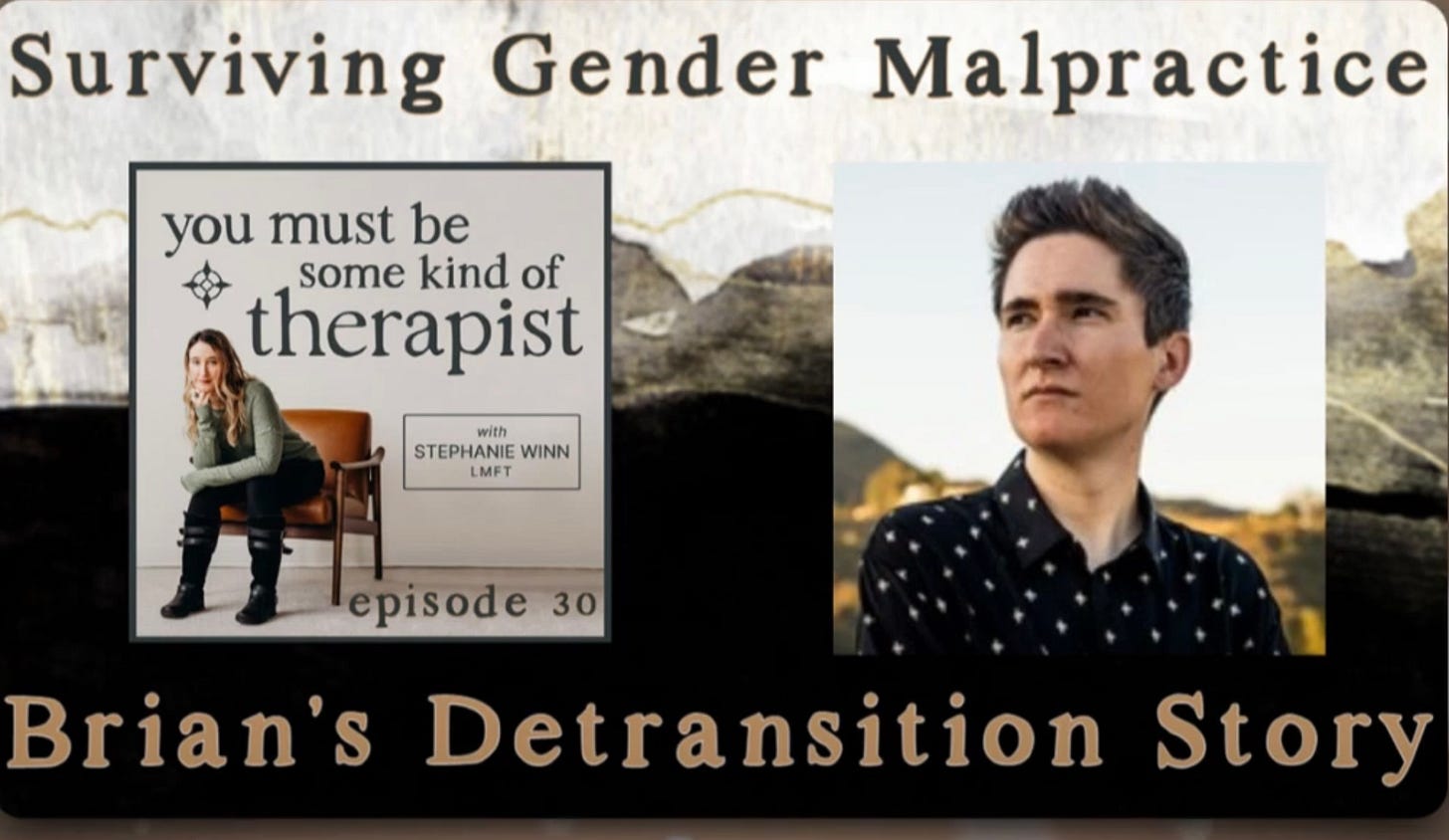Gender-affirming care model
Letter to a health counselor from a practicing mental health professional
Lexi is a DBT focused Licensed Mental Health Counselor in the state of New York. She earned her bachelor's degree in psychology at Hofstra University, and master’s degree in Mental Health Counseling at the University of Miami. She is also a Certified Alcohol and Substance Abuse Counselor Trainee (CASAC-T). She specializes in treating clients struggling with substance use disorders, eating disorders, and borderline personality disorder.
Hello Ms. Lexi,
I've gone back and forth several times over the past few weeks on whether I should send this to you, but I believe it is important. My objective is to express concern and open a dialogue, professional to professional, regarding the affirmative care model.
I'm a mental health provider and received your online training information from PESI, "The Ultimate Guide to Affirmative Care in the Modern Era." Ironically, I got this PESI brochure the same day the New York Times published a piece on why the US has ignored evidence that suggests the affirmative care model may not be beneficial to clients struggling with gender-related issues.
Have you had a chance to read the Cass Review? It's an exhaustively researched study by a British physician, Hillary Cass, demonstrating that there is "weak evidence" to support the gender-affirming model. Or are you familiar with the WPATH Files, a document exposing the shocking lack of research and professional integrity in helping vulnerable patients make life-altering medical decisions? It contains a report, followed by several hundred pages of correspondence between WPATH-affiliated physicians, demonstrating an alarming lack of conscientious patient care.
Both of these documents, along with much other research, have been embraced by several European countries, who have taken this evidence seriously enough to cease many gender-affirming treatments. Another article from the New York Times lays this out well.
I see that your PESI training is geared toward all people in the LGBTQIA+ community, not just those struggling with gender identity. I am aware that people in the LGBTQIA+ community tend to experience higher rates of depression, anxiety, and other mental health diagnoses and deserve the utmost compassion and evidence-based care. My concern in writing to you is not so much focused on treatment for people who identify as lesbian, gay, or bisexual, but on the exponential increase over the past years in the number of people identifying as the opposite gender, and the potential negative consequences of the affirmative care model being the gold standard of treatment for this population.
****
Let me posit a question. If I came to your office and told you that I had always felt like a person with Down Syndrome and that I identified as such (even though genetically I did not evidence the chromosomal composition to make such a claim), and that I finally felt comfortable in my new identity as a person with a genetic disorder, would you affirm me?
Would you write a letter on my behalf suggesting that I am sufficiently mentally stable to have surgery that would help me appear to have this genetic condition and allow me to "live my truth" as a person with Down Syndrome?
Should I then be allowed to join events specifically for people with Down Syndrome, simply because I had declared it to be my "identity"?
Should people take my experience just as seriously as someone who was born possessing this biological reality?
If I went through all these steps and "passed" as a person with Down Syndrome, would I actually BE a person with Down Syndrome? Or if I didn't "pass" (whatever that means), would it be enough for me to simply say it, and expect that everyone else go along with my declaration?
If you're offended by this analogy, I don't blame you. The idea alone offends me deeply and is patently absurd. It invalidates the lived experiences of people who have Down Syndrome. It makes their biological and social reality something to be "put on" like a costume and ignores the challenges they have had to deal with navigating life as an individual with this particular chromosomal composition.
Had I gone to a doctor making this claim, I would hope the mental health professionals treating me would insist that I look very deeply into this belief and that they would help me to process through the difficult issues in my past that had led me to such a faulty conclusion.
How is this any different than a man saying he "is" a woman because he "identifies" as such? How is it any different than a woman saying she is a man because she has "always felt like a man in a woman's body"?
As a person without Down Syndrome, I can never understand what it feels like to have it. Why are we affirming the belief that a man or woman can "feel" like the other sex?
Why it is encouraged (and often mandated) for us as mental health providers, tasked with treating the most vulnerable people, to affirm an impossibility when it comes to gender and sex (and no, I do not believe these are discrete categories), but on the other hand suggest that someone "identifying" into or out of an ethnicity, disability, or other biological reality is deeply offensive?
This feels to me like medically sanctioned cultural appropriation.
My position is that we need to help our clients deal with reality and discover what is behind their belief that they "are" something they are not. We need to lovingly and carefully help them process the deep distress (possibly caused by childhood sexual abuse, early exposure to sexual activity or pornography, homophobia, and/or misogyny, among other negative childhood experiences) and find peace with their healthy, natural bodies.
Have you looked into the growing body of interviews, literature, articles, podcasts, and blogs by detransitioners? Just type "detransitioner" into YouTube and you'll find countless uploads. More are added every day. These are generally young men and women who had gender-related distress and sought treatment from professionals who were supposed to help them. Tragically, they were irreparably harmed by the affirmation model. Many have been prescribed cross-sex hormones and/or had surgeries that have rendered them infertile, unable to perform sexually, and otherwise scarred permanently.
We have little idea what happens to an otherwise-healthy young person who is put on opposite-sex hormones from the time they are barely an adult, and often before they reach full adulthood. Eventually, we are all going to find out. Here's a fascinating interview with a Scottish physiologist who has studied this issue. The damage (which cannot be reversed) is alarming, to say the least.
It seems there's a new face every day of a brave young soul standing up to say, "I was harmed by the affirmative model, and by mental health professionals who did not help me work through the real issues behind my identity crisis."
Here is one such story, about a young man named Brian Wagoner, who lived as a trans woman for about ten years prior to detransitioning.
My opinion is decidedly unpopular among many in the field of mental health. But my concern is for these vulnerable people (specifically children and young adults) who have been sold the lie that they can "change sex."
It is a lie, and telling people otherwise is cruel.
I do not for one second doubt these individuals' distress, nor do I think they are deserving of ridicule or derision. They deserve the very best, most compassionate, caring treatment. But we as mental health professionals need to do better than to affirm an impossibility and discourage dealing directly with reality.
When our society comes to its collective senses (which will likely be precipitated by costly lawsuits that will make it financially untenable to perform surgeries and prescribe hormones of this nature), what will you say your role was?
I know I will be able to say that I did not support it.
This movement is encouraging medical experimentation on vulnerable, desperate people.
I wish nothing but the absolute best, most compassionate, and future-focused treatment and care for people dealing with gender-related distress. However, I firmly believe that the affirmative path we are on is a tragic, fool's errand that will go down in the annals of psychiatric scandals as the worst mistreatment of genuinely distressed people we have yet seen, making the era of lobotomies seem to be a mere blip on the radar of medical malpractice.
****
My intention is not to insult you or your colleagues or suggest that you are anything other than a caring professional with the very best intentions for the clients you are called to serve. But my deeper concern is for people dealing with gender-related distress and how we as a field are doing them a disservice by approaching their care with the affirmation model. I realize this is a complicated, highly nuanced discussion and would be very interested in hearing your feedback.
Thank you for your time!




You articulated many of my feelings so well. Because of the Gender Affirming model, I am afraid to take my 15 year old gender distressed son to any medical professional in my state. Even if it’s for a strep test, he will be asked his pronouns and offered medicalization. He needs to work with a therapist for this issue, but he’s been trained to see anything other than affirmation as “conversion therapy” and that, he’s been told, is extremely dangerous. Parents who only want their children safe and protected are paralyzed from seeking help. It’s criminal.
Yes: "someone "identifying" into or out of an ethnicity, disability, or other biological reality is deeply offensive". And it is deeply offensive to parents to gaslight us that our children are really the opposite sex.